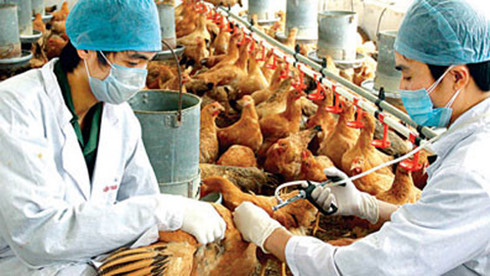Bird flu expands in Vietnam, striking 2 more provinces
 |
No people were affected in the outbreak, which was primarily of the H5N1 strain. The risk of human infection in poultry outbreaks is low, although in China people have died this winter amid an outbreak of the H7N9 virus in birds.
The flock in Bac Ninh has been placed under quarantine, along with many other poultry farms within a 10-km radius of the site, said Nguyen Nhan Lung, head of the provincial Department of Animal Health.
Other flocks in the quarantined area are being tested, Mr Lung added.
Mr Lung also noted the Department had informed the World Organization for Animal Health (OIE) and international trading partners of the outbreak.
According to a report from the OIE the outbreak in Bac Ninh is the second one in recent days of the highly pathogenic H5N1 avian flu virus, raising the number of affected provinces in Vietnam so far this year to seven.
In addition to Bac Ninh, the outbreaks struck backyard birds in the southern province of Tay Ninh.
Both events began on March 3, and taken together, the virus killed 2,050 of 6,600 susceptible poultry. The surviving birds were culled, with other response steps taken, including vaccination, disinfection of the affected premises, and stepped-up surveillance.
Various strains of the virus have spread globally over the past two years, said the OIE in a report, creating concern among scientists about the next pandemic.
Forty new countries have reported avian influenza since November 2016, according to the OIE, with the total number of countries affected now standing at 77 with outbreaks of 13 different strains of the virus.
Authorities in the respective countries have culled millions of birds in affected areas to control the outbreaks, said the OIE.
Government officials across the spectrum and producers have stepped up biosecurity in response to the new cases, as well as to the ongoing outbreaks in Asia, Europe and Africa that have led to the destruction of hundreds of millions of birds and killed dozens of humans.
Bird flu viruses don’t usually spread to people except by close contact with infected birds, but health authorities caution that people everywhere should always be alert to the possibility.
Vietnam government officials are advising producers to be more vigilant about keeping all people and vehicles from entering their farms unless they absolutely have a need to be there.
Farmers may want to implement a ‘Danish entry’ where anyone entering or leaving the barn must sit on a bench, take their boots off, swing their legs around to the ‘clean’ side, put on new boots and clothing that stay in the barn, and reverse the process when they leave.
The most effective method to rapidly eliminate the virus and its spread to humans, according to the OIE, is to rely on the principle of culling (or stamping-out) and continuous monitoring until the virus is completely gone from the flock.
What the stars mean:
★ Poor ★ ★ Promising ★★★ Good ★★★★ Very good ★★★★★ Exceptional
Latest News
More News
- Congratulations from VFF Central Committee's int’l partners to 14th National Party Congress (January 25, 2026 | 09:46)
- List of newly-elected members of 14th Political Bureau announced (January 23, 2026 | 16:27)
- 14th Party Central Committee unanimously elects To Lam as General Secretary (January 23, 2026 | 16:22)
- List of members of 14th Party Central Committee announced (January 23, 2026 | 09:12)
- Highlights of fourth working day of 14th National Party Congress (January 23, 2026 | 09:06)
- Press provides timely, accurate coverage of 14th National Party Congress (January 22, 2026 | 09:49)
- Press release on second working day of 14th National Party Congress (January 22, 2026 | 09:19)
- Minister sets out key directions to promote intrinsic strength of Vietnamese culture (January 22, 2026 | 09:16)
- 14th National Party Congress: Renewed momentum for OVs to contribute to homeland (January 21, 2026 | 09:49)
- Party Congress building momentum for a new era of national growth (January 20, 2026 | 15:00)
















 Mobile Version
Mobile Version